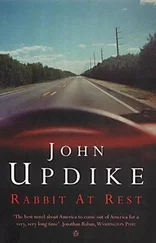Ahmad, steering, tries to agree: "It is not on the Straight Path."
"You kidding? It's the Yellow Brick Road, paved with insidious intentions." In-sid-i-ous, Ahmad thinks, recalling the last time he was preached at. In the side of his field of vision he sees sparks of saliva spray from Charlie's mouth in his hurry to speak. "Sports," the man spits out. "They pay zillions for the rights to televise sports. It's reality without being real. The money has ruined the professional leagues; nobody sticks with their team any more, they jump ship for another fifteen mill when already they can't count the money they have. There used to be team loyalty and some regional identification, but the morons in the stands don't know what they're missing. They think this has always been it, greedy players and records broken every year. Barry Bonds-he's better than Ruth, better than DiMaggio, but who can love that juiced-up surly bastard? Fans now don't know about love. They don't care about it. Sports are like video games; the players are holograms. You listen to these radio talk shows and want to say to these Cheeseheads or Jetheads or whatever who spout off endlessly, 'Oh, please, get a fucking life.' My God, the poor saps have all these statistics memorized, as if they^re getting paid A-Rod's salary. And the so-called comedies the networks dish up-Jesus- who's laughing? It's slop. And Leno and Letterman, more slop. But the commercials, they are fantastic. They're like Faberge eggs. When somebody in this country wants to sell you something, they really buckle down. They get intense. You watch the same commercial twenty times, you see how every second has been weighed out in gold. They're full of what physicists call information. Would you know, for example, that Americans were as sick as they are, full of indigestion and impotence and baldness, always wetting their pants and having sore assholes, if you didn't watch commercials? I know you say you never watch it, but you really shouldn't miss this Ex-Lax commercial with this cute dish with long straight hair and Waspy long teeth who looks out through the camera and tells you, just you, sitting there with your bag of Fritos, that she has a weakness for junk food-skinny as a rail, with a weakness for junk food supposedly-and has to battle constipation sometimes? How old is she? Twenty-five if that, and as buff as Lance Armstrong, and you can bet she hasn't missed taking a dump for a day in her life, but the Ex-Lax CEO wants the old ladies out there not to be ashamed of their plugged-up colons. 'Look,' he's saying to them, the Ex-Lax CEO is saying, 'even a snappy Waspy chick like this can't always take a shit, or keep her underpants dry on the golf course, or her hemorrhoids from ruining her day in the bleachers; so, Grandma, you're not some old piece of crud on the trash heap, you're in the same boat with these young glamour pusses!' "
"It is a society that fears getting old," Ahmad agrees, gently braking in anticipation of a far-off green light's turning red before the truck gets there. "Infidels do not know how to die."
"No," Charlie says, his unstoppable voice halting, and sounding cautious. "Who does?" he asks.
"True believers," Ahmad tells him, since he has asked. "They know that Paradise awaits the righteous." Gazing through Excellency's tall and dirty windshield at the oil-stained macadam and red taillights and blaring blobs of reflected sun that compose a summer day along a truck route in New Jersey, he quotes the Qur'an: "God giveth you life, then causeth you to die: then will He assemble you on the day of resurrection: there is no doubt of it."
"Absolutely," Charlie says. "Good stuff. 'No doubt of it.' Me, if a good reason came up, I'd be happy to cash it in. You, you're too young. You got all your life ahead of you."
"Not so," Ahmad says. He did not hear in Charlie's gruff response the quaver of doubt, the silken shimmer of irony, which he detects in the voice of Shaikh Rashid. Charlie is a man of the world, but Islam is solidly part of that world. Lebanese are not fine-honed and two-edged like Yemenis or handsome and vanishing like Egyptians. He shyly points out, "Already I have lived longer than many martyrs in Iran and Iraq."
But Charlie is not done with the women he sees on television commercials. "And now," he says, "the drug cartels have made such a killing with Viagra and so on they're selling sex enhancement, as they call it, to women. There's one commercial-you may not have seen it, it doesn't come on too often-showing a woman, kind of sensible and plain, a schoolteacher, you figure, or an office manager for some middle-grade tech company, not the upper end, with this little frown on her face so you know something's missing in her life, and the music adds an undercurrent, kind of a minor-key nagging, and the next thing you know you see her floating along swathed in this filmy stuff, barefoot; she better be barefoot, because when you look she's walking on water, trailing ripples, there off the beach where it's just a couple of inches deep, but even so she's not sinking in, and has a new hairdo, and better makeup, so she's gone all misty in the face, like that terrific cocksucker I was describing-I think they have some dilator they put in the eyes of these women to make them look that way-and then you get the reason, the logo of this new 'hormone enhancer,' they call it. The message is, she's been laid. She's been knocking herself silly with multiple orgasms. They would never have admitted that in commercials ten, fifteen years ago-that women want it, they want it a lot; being nicked is a relaxant and a beauty aid. How about you, Madman? You getting a lot lately?"
"A lot of what?" Ahmad's attention perhaps has wandered. They have come off the Turnpike at Bayway and are in some anonymous downtown with a lot of double parking that creates tight spots for Excellency to squeeze through.
"Poontang," Charlie says with exasperation, sucking in his breath as the orange truck scrapes past a lumbering school bus loaded with staring little faces. "Pussy," he clarifies. When Ahmad, blushing, offers no response, Charlie announces in a tone of quiet resolve, "We gotta get you laid."
The towns of northern New Jersey are enough alike- storefronts and sidewalks and parking meters and neon signs and quickly passed patches of civic green space-to create even in a moving vehicle a sensation of being stuck. The territories he and Charlie together drive dirough, with their summer scents of softened tar and spilled motor oil and of onions and cheese exhaled from small eateries out into the street, are much the same until they get south of South Amboy or the Sayreville exit on the Jersey Pike. Yet as one small city yields to the next Ahmad comes to see diat no two are identical, and each has social variety within it. In some neighborhoods large houses sprawl in the shade back from the roadway on lush rising lawns populated by squat trim shrubs like security guards. Excellency makes few deliveries to such homes, but passes tliem on its way to inner-city rows where the front steps spring up straight from the sidewalk, without even the merest excuse for a front yard. Here those awaiting delivery tend to live: darker-skinned families with voices and televisions sounding from back rooms, out of sight, as if chamber after chamber of linked family members telescope out from the vestibule. Sometimes there are signs of Islamic practice-prayer mats, women in hijabs, framed images of the twelve imams including the Hidden Imam with his featureless face, identifying the household as Shia. These homes affect Ahmad with uneasiness, as do the city neighborhoods where shops advertise in mixed Arabic and English and mosques have been created by substituting a crescent for the cross on a deconsecrated Protestant church. He does not like to linger and chat, as Charlie does, making his way in whatever dialect of Arabic is offered, with laughter and gestures to bridge gaps in comprehension. Ahmad feels his pride of isolation and willed identity to be threatened by the masses of ordinary, hard-pressed men and plain, practical women who are enrolled in Islam as a lazy matter of etlinic identity. Though he was not the only Muslim believer at Central High, there were no others quite like him-of mixed parentage and still fervent in tlie faith, a faith chosen rather than merely inherited from a father present to reinforce fidelity. Ahmad was native-born, and in his travels dirough New Jersey he takes interest less in its pockets of a diluted Middle East than in die American reality all around, a sprawling ferment for which he feels the mild pity owed a failed experiment.
Читать дальше












